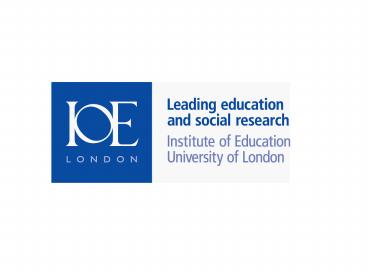Developing distributed leadership that makes a difference - PowerPoint PPT Presentation
1 / 18
Title:
Developing distributed leadership that makes a difference
Description:
Enhanced professional relationships and power sharing. Critical perspectives ... or a professional leadership relationship as a partner, with the mutuality that ... – PowerPoint PPT presentation
Number of Views:48
Avg rating:3.0/5.0
Title: Developing distributed leadership that makes a difference
1
(No Transcript)
2
Developing distributed leadership that makes a
difference
- Jan Robertson
- London Centre for Leadership in Learning
- Institute of Education London
- 2008
3
BES Research on impact on student outcomes
- Leaders who focused their relationships, their
work and their learning on the core business of
teaching and learning had a greater influence on
student outcomes, all else being equal, than
those who had less of a focus on these activities
(Robinson, Lloyd Rowe, 2008). BES LEADERSHIP - Leaders who created the conditions for
distributing leadership by developing the
leadership of others (Timperley, Wilson, Barrar
Fung, 2008). BES PD
4
What we know about successful school leadership
- Successful leaders in schools serving diverse
student populations establish conditions that
support student achievement, equity, and justice. - (Leithwood Reihl, 2003)
- Leadership direction and influence and a
focus on student learning. - Leithwood, Day, Sammons, Harris, Hopkins
(2006)
5
Tomorrows leaders (Robertson Webber, 2002).
- Co-learning and reduced hierarchy
- Shared construction of meaning
- Sense of community and pastoral care
- Formal/informal leadership and public teaching
- Boundary breaking practice (role, rank, gender,
culture, organizational structure) - Confluence of theory and practice
6
Professional partnerships (Robertson, 1995
2008)
- Educational leader a focus on students
achievement as their primary role - Enhanced professional relationships and power
sharing - Critical perspectives and agency
- Examination of values, beliefs, and power
relations in their previous ways of knowing
7
Relationships
- Education is fundamentally about relationships
(Noddings, 2006)
8
Mutual Trust and Reciprocity
- Distributing leadership through sharing power in
relationships - Reciprocity in relationships for the improvement
of learning built on mutual trust and respect - Teachers and leaders as learners
- Students and parents as teachers or influencing
teaching - (Robertson, 2008)
9
Sharing power Relational trust
- Parents respect of teachers grows with genuine
opportunities to influence their work teachers
respect of their leaders grows when they feel
their workplace concerns are taken into account. - In each case the process of genuine listening
fosters a sense of personal esteem for
participants and cements their affiliation with
each other and the larger institution. - (Bryk Schneider, 2002, p. 23).
10
Necessity of distributing leadership through
partnership practice today
- Leadership through partnership parent groups,
school improvement teams, committees, business,
higher education institutions, school districts - ( Rhodes, Stokes, Hampton, 2004)
- Only through such partnership working can the
varied and widespread demands of workforce
development and concept of extended schools
successfully be met. (UK TDA Strategic Plan
2008-2013)
11
Professional partnerships (Robertson,1995,
2008)
- Shifts in leader-teacher relationships
associated with the coaching intervention e.g.
shared accountability, ownership, responsibility,
shared decisionmaking, leadership capacity,
knowledge creation - The consequences of those shifts for the work
involved in the improvement of teaching and
learning. e.g. students self-regulation, parent
involvement, focus on students achievement at
all levels, improved student achievement
12
Tomorrows leaders distribute leadership by
crossing boundaries and creating the conditions
(Robertson Webber, 2002)
- Will include expected role of principals,
teachers, politicians, superintendents, but
significant leadership should arise from ranks of
students, parents, and community members and
non-education players. - Facilitative leadership to gain widespread
involvement in decisionmaking and learning from
the process - Power sharing, discursive practice and cultural
literacy involvement from indigenous and other
non-dominant cultures
13
Formal/ informal leadership (Robertson Webber,
2002).
- modeling educational leadership characterized
as facilitative, collaborative, adaptive,
informed, proactive, and constructive--the
features of the transformational leadership so
necessary in a rapidly changing, postmodern
educational context. - Hess (2008)also describes both formal and
informal leadership, stating that informal
leadership is all about relational power.
14
Formal/ informal leadership (Robertson Webber ,
2002)
- Student
- Enhanced locus of control
- Embraced stress
- Teacher
- Shared leadership
- Modelled leadership
- Clarification of leadership practices
Outcomes Expanded participant profile Shared
responsibility for learning
15
Boundary breaking leadership development
(Robertson Webber, 2002).
- Day 1- day 8 a movement from basic to rich
accountability - From a negative manifestation of accountability
to a positive, confident, efficacious concept.
How will what I do have an impact on students
achievement? - The challenge how to take their own colleagues
on this journey? Being aware of the principles of
distributed leadership practice and the related
learning in order to create those conditions.
16
Leadership developmentThat supports widely
distributed leadership focused on the improvement
of teaching and learning.
- Leaders need experiences of distributed
leadership practice in their development
opportunities, and opportunities to observe,
participate and develop informal and formal
leadership. - A focus on values and beliefs about learning and
leadership, and opportunities to critique
theories in action against espoused theories.
17
Developing tomorrows leaders
- The need to experience the reciprocal processes
necessary to constructivist leadership practice
(Lambert et al, 1995) - learning what it means to enter a learning
relationship - or a professional leadership relationship as a
partner, with the mutuality that that concept
implies.
18
Relationships
- The pity is that parents and schools are asked to
make choices on a test systemthere are much
more important considerations in schools such as
the quality of teaching, the nature of
teacher-students relationships, the satisfaction
by the students that they are being challenged in
their work, the development of effort, engagement
and enjoyment in learning, and the desire to
continue in learning (at university or in the
workplace). - (John Hattie, 2008).































